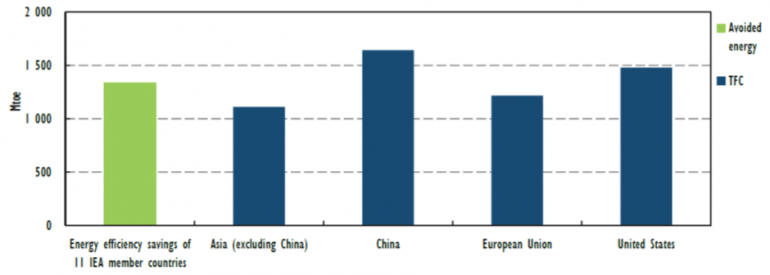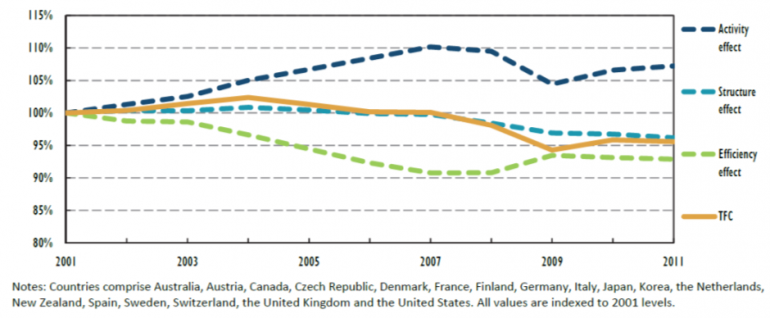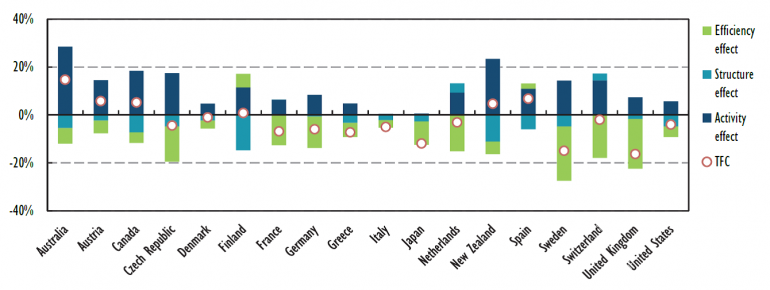Declining energy demand? It's energy efficiency, stupid!
The International Energy Agency has released a report finding that if the energy saved from energy efficiency up to 2011 was considered a fuel, it would be the largest source of energy from any single fuel source across the 11 IEA member countries analysed – greater than coal or oil.
The results of this work, attempting to expose the ‘hidden fuel', provide some striking results worthy of our charts of the week. They illustrate that energy efficiency should be at the centre of energy market analysis and policy, rather than at the sidelines.
The combined energy saved across the 11 nations is so significant that, as illustrated below, it exceeds the entire total final energy consumption of the European Union, and nearly the United States.
Figure 1: Energy efficiency savings compared to total final energy consumption in selected regions, 2011 (millions of tonnes of oil equivalent).

Also, while in Australia the drop-off in demand growth for electricity and gas in the last few years has come as a bit of surprise, this has been a universal phenomenon across much of the developed world.
The chart below illustrates, in the orange line, that total final energy consumption across the 18 IEA member countries is lower now than it was in 2001. Now, part of that is due to the financial crisis economic slowdown, illustrated by the blue activity effect line, but it only explains a small proportion of the decline. Overall output, or activity, is still around 7 per cent higher than in 2001.
Structural change has also played an important part (for example, a move away from manufacturing to services) but energy efficiency has been key in offsetting the growth in energy demand that would normally accompany economic growth.
Figure 2: Changes in aggregate final energy consumption, relative to 2001, decomposed by factor for 18 IEA member countries.

There is a common misconception that the western world has just decoupled emissions from economic growth via offshoring industrial production to the developing world. This is simply not true as testified by the chart above.
In addition the IEA found that efficiency had the largest percentage improvement in the residential sector (not amenable to offshoring), where energy demand reduced in absolute terms by 5 per cent from 2001 levels among the countries analysed.
When isolating for the impact of efficiency, energy use would have been 14 per cent lower than 2001 levels. According to the report this was driven by efficiency improvements of space heating, water heating, lighting and appliances in residential buildings. Efficiency has more than countered growing populations and preferences for larger dwellings in reducing absolute energy use among the countries evaluated. This is also the case for the residential sector in Australia.
Delving down into each country we see Australia has recorded the largest increase in total final energy consumption relative to the other IEA members since 2001 (indicated by the red and white circle). In large part this is simply due to higher economic growth in Australia relative to other western nations. Although New Zealand recorded much lower levels of energy demand growth in spite of similar expansion in activity, but they had a stronger shift in industrial structure towards less energy-intensive sectors. For many of the IEA member countries energy consumption has declined in absolute terms since 2001 as energy efficiency improvement has outpaced the effect of economic activity in boosting energy consumption.
Figure 3: Breakdown on drivers of total final energy consumption 2011, relative to 2001, for 18 IEA member countries.

Overall, the IEA's Energy Efficiency Market Report 2014 estimates that investment in energy efficiency markets worldwide in 2012 was between $US310 billion and $US360 billion. Investment in energy efficiency was larger than supply-side investment in renewable electricity or in coal, oil and gas electricity generation, and around half the size of upstream oil and gas investment.
It all makes you wonder why it got such scant attention in the federal government's recently released Energy Green Paper.
















